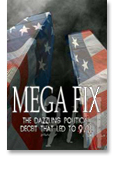Mega Fix Preview Part IV: Khobar Towers
Mega Fix
Eight Part Series:
- Oklahoma City Bombing
- Oklahoma City Aftermath
- Croatia
- Khobar Towers
- TWA Flight 800
- The Atlanta Olympics
- The TWA Flight 800 Aftermath
- The 9-11 Commission
By Jack Cashill
© 2004 WorldNetDaily.com
| In his new stand-up documentary, Mega Fix, Jack Cashill traces the roots of September 11 to the political exploitation of terror investigations by the Clinton White House in the desperate 1995-1996 election cycle. This eight part WorldNetDaily series, which began in Oklahoma City, moves now to Saudi Arabia. |
The "Mega Fix" DVD is available now at the online store.
Throughout the 1996 election cycle Dick Morris only reinforces Clinton’s anxiety. He does not shy from telling the president that despite the lead he has scrambled to gain in his contest against Bob Dole, Clinton has “a soft underbelly,” namely that the majority of the voters do not particularly trust or respect him.
Morris is worried that a terrorist act could expose that underbelly in the months leading up to the November election. In June and July of that year the White House has to deal with “three attacks”—and that’s what Morris calls them, “attacks”--in what Morris now routinely refers to as “the terror summer of 1996.”
Morris’s mantra in the run-up to this year’s election has been, “Things are wonderful.” As Morris well knows, a terrorist act against America can dispel the illusion of “wonderful” in a literal flash. It has “Greg Norman” written all over it. With a hard-earned twenty-point lead over Bob Dole in the mid-summer polls, the last thing Clinton or anyone in the White House wants is a test of the president’s tenuous grip on his role as commander-In-chief.
On June 25, 1996, a powerful truck bomb, not unlike the one that destroyed the Murrah building in Oklahoma City, explodes outside a US army barracks, killing19 American serviceman and wounding hundreds more.
In that the Khobar Towers is in Dhahran, Saudi Arabia, even the media know better than to blame Rush Limbaugh or the NRA or the militia movement. This is undeniably Islamic terrorism. The tough talking President Bill Clinton promises revenge:
"The cowards who committed this murderous act must not go unpunished," he says angrily. "Let me say again: We will pursue this. America takes care of our own. Those who did it must not go unpunished."
The next day, he weighs in again, "Let me be very clear: We will not resist" — oops, the president corrects himself — "we will not rest in our efforts to find who is responsible for this outrage, to pursue them and to punish them."
Well, maybe, maybe not.
While Clinton is talking tough, Dick Morris is busily conducting polls to gauge the public's reaction to the bombing.
"Whenever there was a crisis, I ordered an immediate poll," Morris recalls. "I was concerned about how Clinton looked in the face of [the attack] and whether people blamed him." It is Greg Norman time at the White Hose.
Morris's first poll shows less support for Clinton than he had hoped. But after a good deal of Clintonian bluster, public approval of Clinton's response climbs. Morris records this in his written agenda for a meeting:
SAUDI BOMBING —
Recovered from Friday and looking great Approve Clinton handling 73-20
Big gain from 63-20 on Friday
Security was adequate 52-40Bottom line:
It's not Clinton's fault 76-18
With the political fallout contained, Clinton hands this case off to law enforcement just as he did after the first World Trade Center bombing. But this time, the Clinton administration not only fails to follow useful leads, but it also actually gets in the way of the investigators.
So frustrated is FBI head Louis Freeh by Clinton’s obstruction that he asks former president George H. W. Bush to intercede with the Saudi royal family. Unknown to Clinton, Bush does just that, and the Saudis begin to provide new information. This information points to Iran as the Clintons suspected it would from day one.
Still, Freeh never gets the support he wants from the Clinton White House. He hangs on to his job to 2001 largely to prosecute this case. Just before Freeh leaves office, he meets with George W Bush and gives him a list of suspects in the bombing. In June 2001, attorney general John Ashcroft announces the indictment of 14 of them.
But valuable time has been lost, and Washington remains woefully unprepared for the terror that looms just three months later. America stands defenseless to a large degree because the White House has all but ignored the attack on Khobar Towers and fully suppressed the evidence of the two other attacks from the terror summer of 1996.
Dick Morris identifies these two additional “attacks” as the Olympic Park bombing and the destruction of TWA Flight 800. When I appeared with Morris on a radio show, he absolutely refused to clarify what he meant by an “attack.” He is still dodging.

Next in the series: Mega Fix Preview Part V: TWA Flight 800
Jack Cashill is an Emmy-award winning independent writer and producer with a Ph.D. in American Studies from Purdue.
 |
